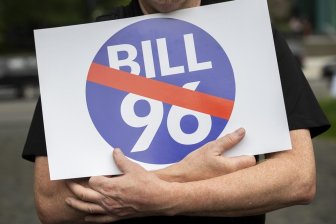A ban on the use of athletes and celebrities in online gambling ads in Ontario, including for sports, is set to take effect next month. But some advocates are calling for a nationwide ban on sports betting commercials to better protect children and youth in Canada.
Gambling in sports is not new. But as soon as the federal government legalized single-game sports betting in 2021, the flood gates opened for advertisements to play during hockey games, on social media applications and on the internet.
Former Olympian Bruce Kidd, who is also a professor emeritus of sport policy at the University of Toronto, told Global News that research from multiple countries has shown young people are persuaded by these ads into wanting to gamble.

“We see these ads grooming children and youth to become life-long betters and risk the addictions,” he said.
Researchers at Ipsos Mori and the University of Stirling published a report in 2020 after examining the impact of gambling marketing and advertisements on children, young adults and vulnerable groups in the U.K. It found exposure over the span of one month led to a higher likelihood those aged 11-24 would bet later in life.
It’s why Kidd started The Campaign to Ban Advertising for Gambling, where advocates — including three-time hockey dad Karl Subban and Olympic medalist Clara Hughes — have called for these commercials to be banned.

According to University of Toronto – Scarborough psychology professor Steve Joordens, part of the issue faced when it comes to gambling is that it’s tied to random rewards and a dopamine release.
When it comes to advertisements, he said they can often be geared toward just getting someone to start.
“Just get the person to reach into their pocket,” he said. “You know, they don’t even have to go to a casino anymore. Just reach into their pocket, pull out their phone and they can be off and gambling.”
Sport betting ads have ‘robust’ regulations
Canadian Gaming Association President and CEO Paul Burns said though he understands concerns around gambling, there are already “robust” standards surrounding sports betting advertisements around the images they put forward and even the ages of actors used to limit or outright prevent appeal to minors.
Get the latest National news.
Sent to your email, every day.
Leagues and broadcasters have also put their own policies in place, he said, so that they can still interact with wagers in sport and still have their product be available to fans of all ages.
“Everybody has been leaning in to make sure they’re getting it right,” Burns told Global News in an interview. “No one wants to target minors, no one is intentionally targeting minors, and the gambling is a part of our society. It is normalized behaviour.”
Yet that normalization is why Joordens warns with the influx of advertisements on sports betting, children can be at risk because the commercials have become so “integrated” into broadcasts and other elements of sport — even having banners for various gambling companies at hockey rinks and other venues frequented by youth.

“When children kind of see this connection between the two, well, now if they love sport, they just naturally do that next step of gambling,” he said.
According to the Centre for Addiction and Mental Health, there were 3,617 calls received to the ConnexOntario Problem Gambling hotline in 2023 up until October. Connex provides a directory of mental health and addiction services, including the helpline for the province. Of that number, there were 2,330 calls in which a game was provided, and 1,416 that were specifically about online gambling.
Scientist and mental health expert Nigel Turner notes the numbers did not include horse racing — another popular form of sports betting.
Celebrities and professional athletes participating in these commercials doesn’t help, Joordens adds, as seeing people they admire could create a greater influence on children.
Banning athletes, celebrities from gambling ads
It’s an issue the Alcohol and Gaming Commission of Ontario (AGCO) pointed out when they put forward the original proposal for banning athletes in the advertisements.
That same ban on public figures being used in these promotions is also the focus of a bill before the Canadian Senate, calling for Heritage Minister Pascale St-Onge to develop a national framework on advertising for sports betting. It could include the restriction of such advertising, while also promoting research into the prevention as well as diagnosis of minors involved in “harmful gambling activities” and to have supportive measures for those impacted.
St-Onge’s office, in a statement to Global News Thursday, said Canadians are concerned about the financial, mental health and addiction impacts of online gambling advertising, especially on young people, and are aware of the bill put forward by Sen. Marty Deacon. Her office notes the bill would set out standards similar to regulations for regulating tobacco and alcohol ads, adding that they are following debate in the Senate and will examine the bill once introduced in the House of Commons.
Kidd notes while the bill is helpful, Canadians currently face varying degrees of regulations from each province and territory with Ontario putting forward some of the most aggressive rules for the gambling companies.

While he said the banning of celebrities and athletes is a good step, more needs to be done including wanting to see these types of advertisements — even if identified as such on-air — be removed from being read by broadcasters.
Changes are always open for discussion, Burns told Global News, adding the industry is not opposed to more regulations. He notes the legalization of single-game sports betting was a benefit as created more oversight on the gambling industry. Prior to 2021, a lot of activity was being done by offshore companies not subject to regulatory oversight.
“We want people to know where to go, that these are the sites you should go to if you’re going to gamble, who you should gamble with,” Burns noted.
Those regulations are a benefit, but Kidd reiterated a full ban is what he wants to see because he believes sports betting has impacted the meaning of sport.
“It disembodies sport, it removes sport from a whole cultural performance context, it removes sport as a team game,” he said. “It removes sport as a community cultural activity.”
— with files from Global News’ Ryan Rocca and Mike Armstrong






